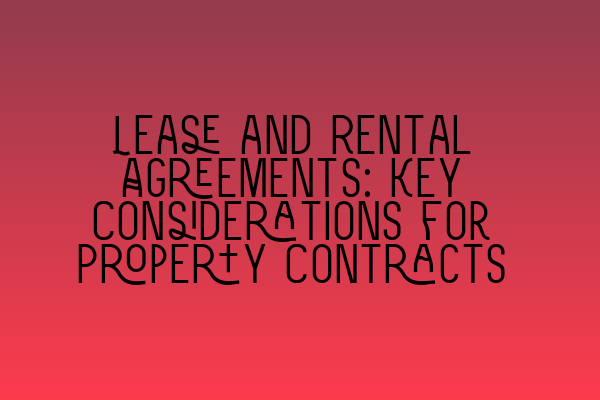Lease and Rental Agreements: Key Considerations for Property Contracts
When it comes to leasing or renting a property, it’s crucial to have a well-drafted agreement in place. A lease or rental agreement outlines the terms and conditions of the property rental, protecting both the landlord and the tenant. Whether you’re a landlord or a tenant, understanding the key considerations for property contracts is essential to ensure a smooth and legally sound leasing process.
In this blog post, we will discuss the important factors to consider when entering into a lease or rental agreement. From the duration of the lease to the payment terms, we’ll cover everything you need to know to navigate the world of property contracts. So, let’s dive in!
1. Duration of the Lease
The duration of the lease is one of the primary considerations in a property contract. It specifies the length of time the tenant has the right to occupy the property. Typically, leases can range from six months to several years. It’s important for both parties to agree upon a suitable duration that aligns with their needs and plans.
2. Rent Payment Terms
The agreement should clearly state the rent amount and the frequency of payment. It’s crucial to specify the due date, the acceptable payment methods, and any penalties for late or missed payments. By being transparent about the rent payment terms, both parties can avoid misunderstandings and foster a positive landlord-tenant relationship.
3. Use of the Property
The lease or rental agreement should define the permitted use of the property. Whether it’s a residential or commercial property, the agreement should specify the specific purposes for which the tenant can use the premises. This helps prevent any misuse of the property and ensures that the tenant adheres to the agreed-upon activities.
4. Maintenance Responsibilities
Determining maintenance responsibilities is another vital aspect of a property contract. The agreement should clearly state who is responsible for the maintenance and repairs of the property. Typically, landlords are responsible for major repairs, while tenants are responsible for day-to-day maintenance and minor repairs. Clearly defining these responsibilities helps avoid disputes and maintains the property’s condition.
5. Security Deposits
Security deposits are a common practice in lease and rental agreements to protect landlords from potential damages caused by tenants. The agreement should outline the amount of the security deposit, the conditions for its return, and any deductions that may be made. It’s important to be clear about the obligations of the tenant regarding the preservation of the property to ensure the smooth return of the security deposit.
6. Termination and Renewal
Both parties should have a clear understanding of the termination and renewal terms. The agreement should outline the notice period required for termination and the procedures for renewing the lease. This allows both parties to plan ahead and makes the transition process smoother.
7. Legal Compliance
A well-drafted lease or rental agreement should comply with the applicable laws and regulations. It’s essential to include clauses that address legal obligations, such as safety standards, insurance requirements, and compliance with local zoning regulations. By ensuring legal compliance, both landlords and tenants can avoid legal complications down the road.
8. Dispute Resolution
In the unfortunate event of any disputes between the landlord and tenant, having a clause that addresses dispute resolution mechanisms can be extremely advantageous. The agreement should specify the preferred method of resolving disputes, such as mediation or arbitration, to avoid costly and lengthy legal battles.
Conclusion
Lease and rental agreements are crucial documents that protect the rights and interests of both landlords and tenants. By considering the key factors mentioned above, you can ensure that your property contract is comprehensive, clear, and legally sound.
If you’re looking for additional resources to help you prepare for the SQE exams or seeking SQE 1 and SQE 2 preparation courses, click on the links below:
– SQE 1 Practice Exam Questions
– SQE 1 Practice Mocks FLK1 FLK2
– SQE 2 Preparation Courses
– SQE 1 Preparation Courses
– SRA SQE Exam Dates
At SQE Contract Law, we provide comprehensive legal services to support your lease and rental agreement needs. Our team of experienced solicitors can assist you in drafting, reviewing, and negotiating property contracts to ensure your interests are protected. Contact us today for a professional and reliable legal service.
DISCLAIMER: This blog post is for informational purposes only and does not constitute legal advice. It is recommended to consult with a qualified solicitor to address your specific legal concerns.
